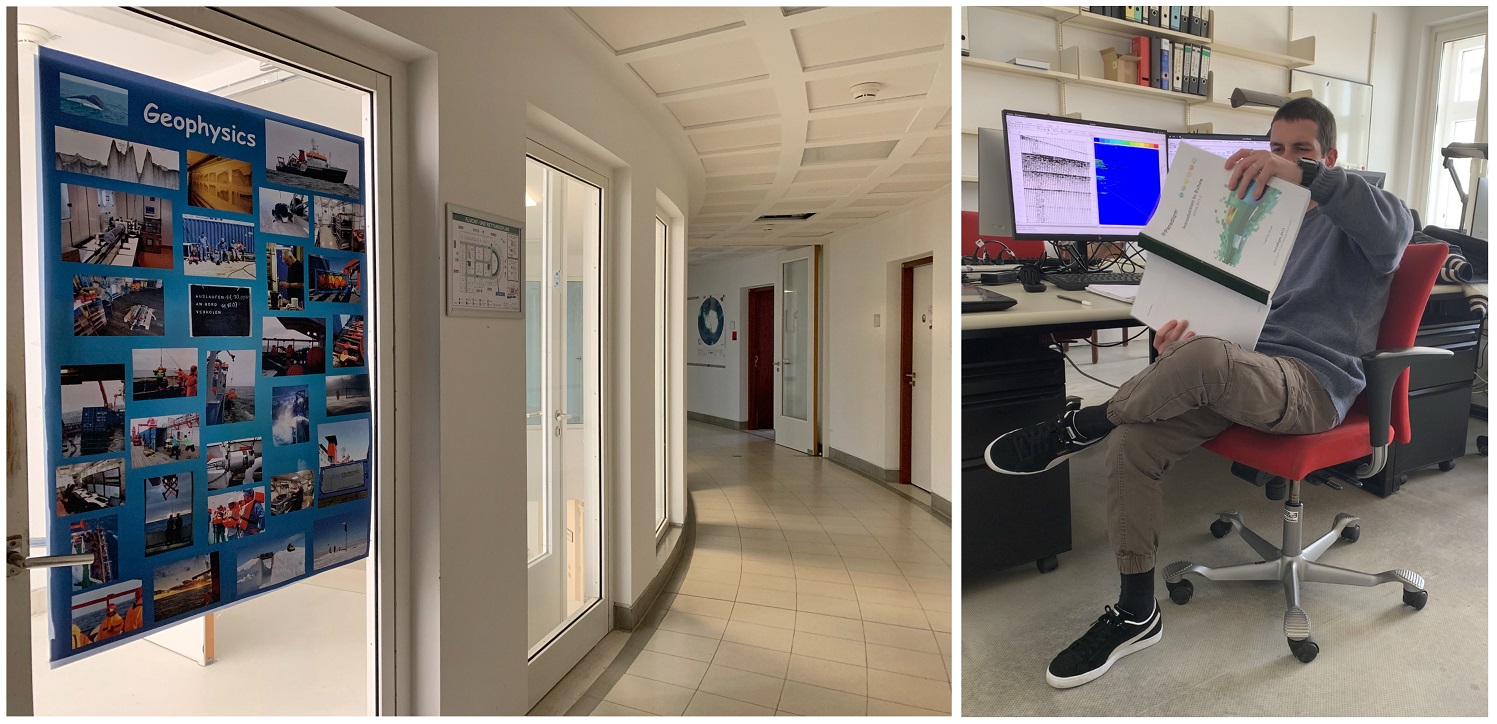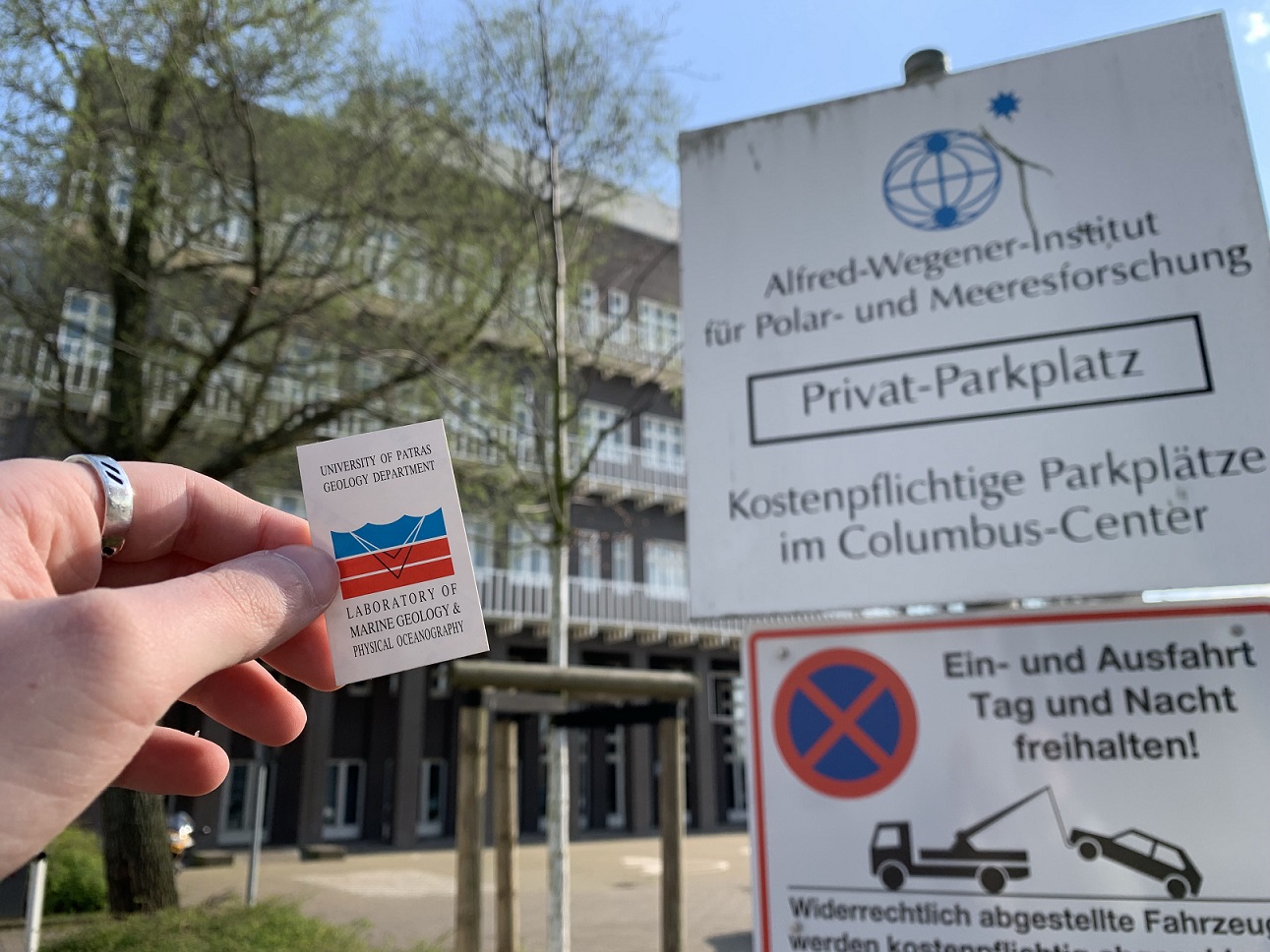"If you’re scared to take chances, you'll never have the answers…": From Oceanus-Lab to the Alfred Wegener Institute
The Alfred Wegener Institute for Polar and Marine Research (AWI), named after Alfred Wegener, the great climatologist, geologist, meteorologist, and polar researcher, was founded in 1980 and is based in Bremerhaven, Germany. The institute conducts research in the Antarctic, the Arctic and the seas and coastal regions of the temperate latitudes and consists of three major divisions, the Geosciences, Biosciences and Climate Sciences.

Maintenance of RV Polarstern after its return from Antarctica.
Nick Giannopoulos, graduate of the Department of Geology and current postgraduate student in the Interdepartmental MSc "OCEANOGRAPHY - Exploration, mapping and management of the marine environment" of the University of Patras, describes his experience with oceanography, the Oceanus-Lab, his studies, as well as his internship at the AWI:
What led to your preference in oceanography and choosing to pursue the master’s degree?
During my undergraduate studies it took me a while to get on track, however, it became apparent that I was starting to grow an interest in oceanography from the first semester, as the course “Principles of Oceanography” stood out to me. The secrets and mechanisms of the oceans, the methods and tools used, as well as the people who introduced us to this field, triggered my interest for it. During my undergraduate thesis, I worked in a different lab in the Sector of General, Marine Geology & Geodynamics. Even though I was satisfied with the working conditions, I realized that I had a growing desire to join Oceanus-Lab, as I found myself regularly checking the aims and projects of the team. Therefore, after my graduation, I decided it was finally time to be part of it.
What is your experience of the Interdepartmental MSc "OCEANOGRAPHY - Exploration, mapping and management of the marine environment"?
I consider the establishment of the master’s program a wise move as it has the support of a capable and modern lab. As I am getting closer to the end of my studies, with a well-rounded point of view, I have to say that the courses provide a thorough understanding of most of the fields of oceanography, worth noting that it also acclimates students to biology, and it gives them the opportunity to specialize through their theses. Personally, I was leaning towards marine geophysics from the beginning, since the undergraduate course “Remote Sensing in the Marine Environment” of the fifth semester really caught my attention and ended up being my favorite overall. The MSc helped me validate my choice and now I have the freedom to focus on this field through my thesis. In general, I believe the Department of Geology should adopt a more practical approach and emphasize on getting students familiar with the use of processing tools and programming. This seems to be the norm abroad and, fortunately, the postgraduate program tries to implement this mentality and I hope it sticks to it even if it seems challenging for some students. Nevertheless, there is passion in the field and, provided you are interested, a whole lot to gain.
What opportunities/resources have been given to you through the postgraduate program and the Oceanus-Lab for personal growth? Did you gain experience that helped you with your internship?
Without the experience I gained during the last year, I don’t think I would have felt ready for the step I took. Beyond the expected stuff (the documents and CV that paved the road for my internship), the lab guided me, showed me the opportunities and, last but not least, taught me how to be independent and look up for anything that I may need on my own, when needed. I believe it prepared me accordingly for the future, especially considering that you don’t usually develop this mindset in undergraduate studies in Greece.
The postgraduate program provides nearly anything you might need, but it is up to you to make the best of it. The team is ready to support you as long as you show the corresponding passion. I appreciated this a lot since I came to Germany, because people have a similar mentality here. They expect you to study and experiment on your own and they help you when you have specific questions. It might seem harder, but you learn a lot more that way.

Building D of the Alfred Wegener Institute.
What is your experience from the internship so far?
I decided to come to the Alfred Wegener Institute for 3 months with Erasmus+ as I have wanted to experience living abroad, especially in Northern Europe, for years. More specifically, I chose the AWI for three reasons, the first being, as mentioned above, its location (Northern Germany). Secondly, the institute focuses on polar research, which is quite different from what I have been familiar with until now. This excited me because I had the opportunity to work on data from new environments and meet people with different experiences.
Finally, the institute is one of the largest of its kind worldwide. It has over 1000 employees and countless facilities, so it makes sense to feel like it is poles apart from the Oceanus-Lab, at least at first glance. It is a very interesting experience because in the Geoscience division you come across similar research topics, but at the same time you notice the differences. I am doing my internship in the Geophysics Section which has more personnel than the entire lab in Patras. As expected, there is a lot of specialization with equipment and tools that was completely new to me. It was hard trying to figure everything out, but you really benefit when you try to learn something new. Then again, when you work in such an institute, you can’t experience the same teamwork vibe that a small lab offers and you choose to specialize, whereas in a small lab you must have general knowledge about a wider range of topics. At the end of the day, it all comes down to personal preference.

Nick in his working space.
Next steps?
I will be back in Greece in the Summer and focus on finishing my thesis until Fall. Having gained experience from two different working environments I will then be able to think and decide which path I am going to take. I think that, given the opportunity, I will try to continue doing research, either in Greece or abroad. Time will tell.
Wrapping up, do you have any advice for people (undergraduate, graduate or high school students) who are interested in the field of oceanography?
Oceanography consists of many fields, covers a wider range of topics than many might think and provides a lot of career opportunities. This became apparent to me throughout my postgraduate studies but also during my stay in Germany, as I am interacting with people that come from departments of geosciences, biology, physics, chemistry and climate sciences. Each one specializes in their field but there is much cooperation and discussions where valuable knowledge is exchanged and used together. For those considering discovering oceanography, I am wishing them an adventurous journey. They should open their minds, experiment and chase the unknown. During my first days here, I got a reality check as I was in a new environment that put pressure on me and made me realize that my knowledge is limited. Ultimately, I understood that the point of research is to try to overcome barriers, not have the results handed to you. If you’re scared to take chances, you'll never have the answers...

All images courtesy of Nick Giannopoulos.